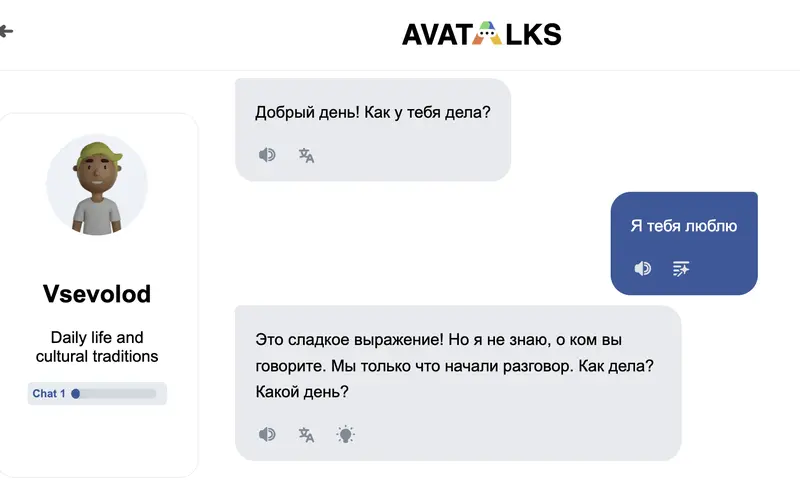
If you’re asking how do you say I love you in Russian language, the most important phrase to learn is:
Я тебя люблю (ya tebya lyublyu) — “I love you.”
But learning this phrase is about more than translation. Russian speakers use love expressions differently than English speakers. Timing, tone, and pronunciation all matter. Saying the right phrase at the right moment helps you sound natural and emotionally sincere—not robotic or rehearsed.
From our experience, learners usually find reading Russian love phrases easier than speaking them confidently. Pronunciation confidence and emotional authenticity often develop only after repeated speaking practice. This is why speaking practice—especially with interactive AI avatars—helps learners move from memorization to real communication.
In this guide, you’ll learn:
- The correct way to say “I love you” in Russian
- When to use it (and when not to)
- Alternative phrases for different relationship stages
- Common Russian terms of endearment
- Cultural insights that help you sound natural
- Practical tips to practice speaking with confidence
You’ll finish this guide knowing exactly how Russian speakers express love in real life.
The Core Phrase: Я тебя люблю

Russian: Я тебя люблю
Pronunciation: ya tee-BYAH lyoo-BLYOO
Meaning: I love you
This is the standard romantic expression used between partners.
Why Russian word order is different
Literally translated, Russian says:
“I you love”
Russian grammar allows flexible word order, but this version is the most natural and commonly used.
When native speakers use this phrase
Russian speakers typically use Я тебя люблю when:
- They are in a serious relationship
- They feel emotionally committed
- They want to express genuine love
Unlike English, Russians rarely use this phrase casually.
At Avatalks, learners often find it easier to read Russian love phrases than to say them aloud at first. This hesitation is normal. Emotional expressions in a foreign language feel more vulnerable, which is why repeated speaking practice helps build confidence.
Pronunciation Breakdown (Critical for Natural Speech)
Russian pronunciation depends heavily on stress and sound clarity.
Break the phrase into parts:
- Я → ya
- тебя → tee-BYAH
- люблю → lyoo-BLYOO
The stress falls on:
- BYAH in тебя
- BLYOO in люблю
Incorrect stress can make your pronunciation sound unnatural.
Practical speaking tip
When practicing, focus on rhythm:
ya tee-BYAH lyoo-BLYOO
Smooth flow is more important than speed.
Practicing with spoken interaction helps learners develop natural rhythm faster. You can explore structured speaking practice in our guide to AI language learning, which explains how interactive speaking accelerates fluency.
Why Russians Use “I Love You” More Carefully
One of the biggest cultural differences is emotional weight.
In English-speaking cultures, people may say “I love you” relatively early.
In Russian culture, this phrase carries deeper emotional commitment.
It often signals:
- Serious emotional attachment
- Long-term relationship intention
- Genuine romantic feelings
Because of this, Russian speakers often use lighter phrases first.
Understanding this helps you avoid sounding unnatural or emotionally overwhelming.
Softer Alternatives Before Saying “I Love You”
If your relationship is still developing, use gentler expressions.
Ты мне нравишься
Pronunciation: ty mne NRAvishsya
Meaning: I like you
This is common during early dating.
Ты мне очень дорог / дорога
Pronunciation: ty mne OCH-en DO-rug / do-RO-ga
Meaning: You are very dear to me
- дорог → used when speaking to a male
- дорога → used when speaking to a female
This expresses emotional closeness without full romantic commitment.
Я обожаю тебя
Pronunciation: ya aba-ZHA-yu te-BYA
Meaning: I adore you
This is affectionate and emotional but slightly less serious than “I love you.”
These intermediate phrases help relationships progress naturally.
Stronger and More Emotional Variations
Once your relationship is serious, you can express deeper emotion.
Я люблю тебя всем сердцем
Meaning: I love you with all my heart
This adds emotional intensity.
Я люблю тебя всей душой
Meaning: I love you with all my soul
More poetic and expressive.
Я не могу жить без тебя
Meaning: I can’t live without you
Very strong emotional expression.
Use these only when appropriate.
Russian Terms of Endearment (Used Daily)
Russian speakers frequently use affectionate nicknames.
These create emotional warmth even without saying “I love you.”
Common examples
Милый / Милая — darling
Любимый / Любимая — my beloved
Дорогой / Дорогая — dear
Солнышко — sunshine
Зайчик — little bunny
Котик — kitten
These terms are extremely common in real conversations.
At Avatalks, learners often report that using these nicknames makes their speech feel more authentic and emotionally expressive.
Family vs Romantic Love in Russian
Russian distinguishes emotional relationships through context.
Romantic love
Я тебя люблю → romantic partners
Family love
Parents may say:
Я тебя люблю → to children
But frequency is lower than in English-speaking cultures.
Friendship
Instead, Russians often say:
Ты мне дорог → You are dear to me
This maintains emotional warmth without romantic meaning.
Common Mistakes Learners Make
Mistake 1: Incorrect pronunciation stress
This is the most common issue.
Solution: practice aloud regularly.
Mistake 2: Using the phrase too early
Culturally, timing matters.
Use softer alternatives first.
Mistake 3: Only memorizing without speaking
Reading is not enough.
Speaking builds fluency.
Many learners understand phrases passively but hesitate during real conversations. Active speaking practice helps bridge this gap.
Beginner, Intermediate, and Advanced Usage Guide
Beginner level
Learn and practice:
- Я тебя люблю
- Ты мне нравишься
Focus on pronunciation.
Intermediate level
Add emotional variations:
- Я тебя обожаю
- Ты мне очень дорог
Learn when to use each.
Advanced level
Use natural expressions and nicknames:
- Любимая
- Солнышко
- Я люблю тебя всем сердцем
This helps you sound fluent and emotionally authentic.
How to Practice Saying “I Love You” in Russian Effectively
Speaking practice is essential.
Step 1: Repeat aloud daily
Focus on pronunciation and rhythm.
Step 2: Listen to native speakers
Russian films, shows, and conversations help develop natural speech patterns.
Step 3: Practice speaking interactively
Interactive speaking helps overcome hesitation.
Many Avatalks learners report that practicing emotional phrases with AI avatars helps reduce anxiety and improve confidence before speaking with real people.
Step 4: Use phrases in real situations
Even practicing alone builds confidence.
Consistency is more important than perfection.
Quick Reference Table
| English | Russian | Pronunciation |
|---|---|---|
| I love you | Я тебя люблю | ya tee-BYAH lyoo-BLYOO |
| I like you | Ты мне нравишься | ty mne NRAvishsya |
| I adore you | Я тебя обожаю | ya aba-ZHA-yu te-BYA |
| You are dear to me | Ты мне дорог | ty mne DO-rug |
| My love | Любимая / Любимый | lyu-BEE-ma-ya |
FAQ
Can you say Я тебя люблю to friends?
No. It is typically romantic or family-only.
Use:
Ты мне дорог → You are dear to me
Is this phrase formal or informal?
It is informal because it uses ты.
Formal romantic usage is rare.
Is pronunciation important?
Yes. Correct stress improves clarity and confidence.
How long does it take to feel comfortable saying it?
Most learners improve quickly with consistent speaking practice.
Regular speaking sessions accelerate progress significantly.
Final Thoughts
So, how do you say I love you in Russian language?
The essential phrase is:
Я тебя люблю
But true fluency means understanding:
- When to use it
- How to pronounce it naturally
- Which alternatives fit different situations
Learning emotional expressions strengthens both language skills and real human connection.
With consistent speaking practice, these phrases become natural—not memorized, but genuinely felt and confidently spoken.